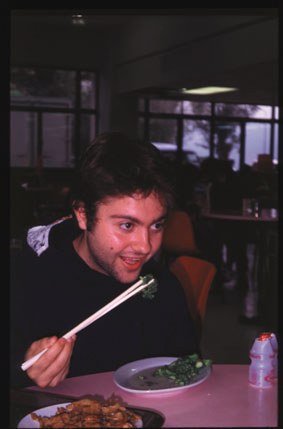 Herbivores,
unite!
Herbivores,
unite!Vegetarians extoll the virtues of meatless diets



 Herbivores,
unite!
Herbivores,
unite!
Vegetarians extoll the
virtues of meatless diets
By Emily Hui
Miss Alison Wong, 19, became a vegetarian when she turned to Buddhism at age 12.
“My skin turned fine and smooth after developing my current eating habits,” Miss Wong said. “I think this is because vegetarian food facilitates digestion.”
She also said animal flesh may contain germs and diseases that cannot be killed even after the flesh has been washed and cooked thoroughly.
Miss Joyce Pa-ng, 19, who followed her father’s example in becoming a vegetarian, commented that a vegetarian diet is “definitely healthful.”
She said, “Since becoming a vegetarian, I have been free from serious sicknesses and stay fresh and energetic most of the time.”
But there are also people who doubt that diets without meat provide sufficient energy and nutrients.

An illustration of the Healthy Diet Pyramid. |
Dr. Georgia S. Guldan is an associate professor of biochemistry at The Chinese University of Hong Kong. She said, “It is healthful to have a vegetarian diet if you are careful.”
She explained this with reference to what she called the “Healthy Diet Pyramid”.
The pyramid suggests that people’s daily intake should consist of lots of grains, fruits and vegetables; less meats, eggs, dairy products and beans; and a little fat, sugar and salt.
She said diets without meat are still perfectly healthful, provided that people get sufficient nutrients from vegetables.
Said she: “The animal protein can be compensated by soya bean and rice.
“There is only one nutrient, vitamin B12, which cannot be substituted for in vegetarian food.
“However, it is so minor that the absence of this nutrient will not constitute any problem.”
For people who encounter difficulties adapting to a vegetarian diet, like Ms Chan, Dr. Guldan suggested that they cut down the level of meat consumption gradually.
When asked whether a vegetarian diet can improve skin texture, Dr. Guldan said, “It is possible for some vegetarians to see their skin texture improved, because vegetarian food contains less fat.
“But it also depends on the person’s age, body condition and hormonal status.”
Research in the United States has proven that vegetarians have longer life spans and lower risk of cardiac disease and colon cancer, which are common fatal diseases among meat eaters.
Public Health Report No. 1, published by the Department of Health in 1994, stated, “Coronary heart disease emerges as the top killer in Hong Kong. It caused 3,181 fatalities in 1992.”
Dr. Guldan said cholesterol, which comes only from animals, is the key factor in the hardening of blood vessels that contributes to coronary heart disease.
Besides, vegetables have plenty of dietary fibre, which facilitates digestion.
Recent statistics show that adolescents in Hong Kong only have 3 to 4 percent of dietary fibre intake in their diets. However, the recommended level of dietary fibre in Britain and the United States is 18 percent.
As stated in Public Health Report No. 1, “Adjustment to our lifestyle offers the most acceptable and affordable approach to the achievement of health gains for Hong Kong in the next decade.”
Miss Annie Chu, 22, became a complete vegetarian 2 years ago. She said, “Although meat contains a lot of protein and other nutrients, it is difficult to digest and therefore stays longer inside the body.
“Imagine that fresh meat without handling properly turns bad in one day. Then, how terrible it must be when the meat stays inside the body for several days.”
Dr. Guldan said it is not scientific to think that meat stays longer inside the body.
Said she: “Meat will not stay very long in the body, since there are various enzymes in the mouth, stomach and intestine for digestion.”
Dr. Guldan also pointed out some other misunderstandings of the benefits of a vegetarian diet.
“Though vegetarian food contains less fat, it does not assure a weight loss. This is because body weight does not only depend on one’s food intake, but also depends on energy exhaustion and genetic influence,” said Dr. Guldan.
She emphasized that vegetarianism should not be seen as a way to lose weight.
Nevertheless, more people are changing to vegetarian diets. As a result, the number of vegetarian restaurants in Hong Kong has increased over the past few years.
Some restaurants have vegetarian food buffets and meat substitutes such as vegetarian chicken, ham, abalone and shark’s fin.
Miss Chu said, “I have tried vegetarian chicken. The appearance, taste and smell are almost the same as a real chicken. It even has ‘innards’.”
Said Dr. Guldan: “Most meat substitutes, like mock chicken, are made of beancurd and gluten.
“Gluten is a kind of wheat product which is rather tasteless. So lots of flavouring needs to be added to make it taste like real meat.
“These substitutes are all right for the health. But they should not become an integral part of a vegetarian diet.
“They were just invented for those who like the taste of meat.”
She criticized the food sold by many vegetarian restaurants. Some vegetarian food is not really healthful, as plenty of oil is used in the cooking process, she explained.
She also added, “Processed flour is used instead of natural flour, especially for dumplings that contain lots of sugar.
“According to the Healthy Diet Pyramid, oil and sugar should be the least consumed.”
Instead of dining out, Ms Lam Kim Mui, a 68-year-old vegetarian, likes to cook vegetarian food herself.
The ingredients that she usually uses to make vegetarian dishes are dried beancurd sheets, mushrooms, vermicelli and carrots.
“I have been a vegetarian for more than 20 years. My body has worked very well all through the years, and I do not have any serious illnesses, even though I am old,” she said.
Dr. Guldan said, “We should be careful and educated vegetarians.”


